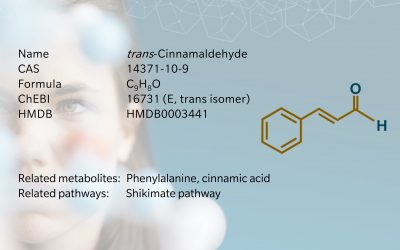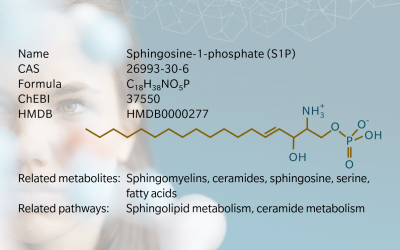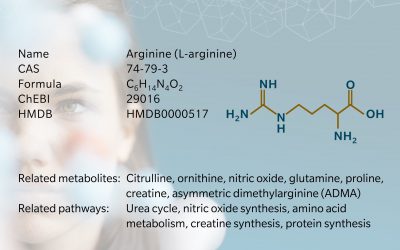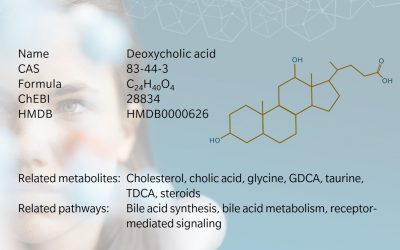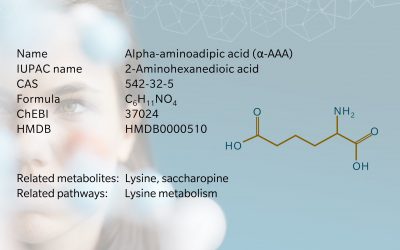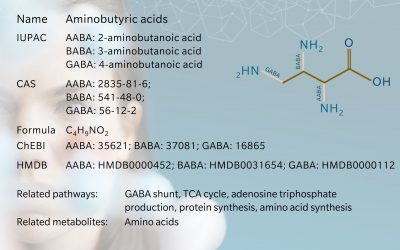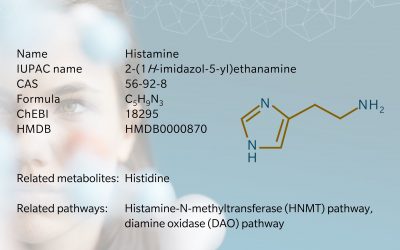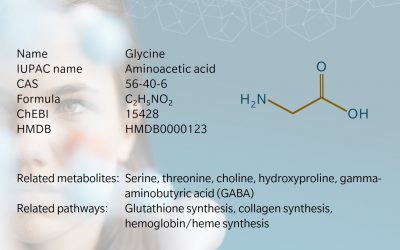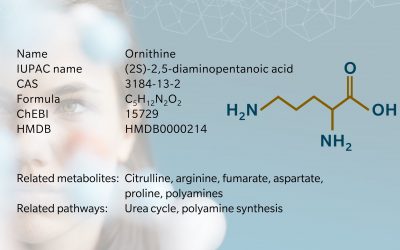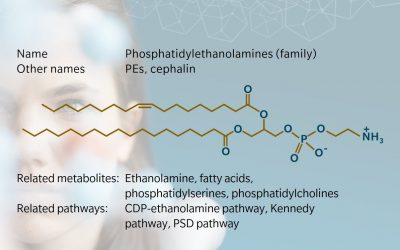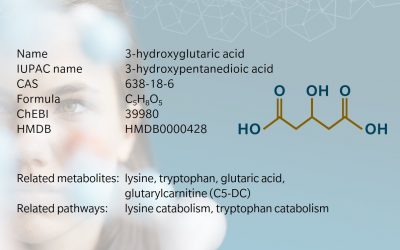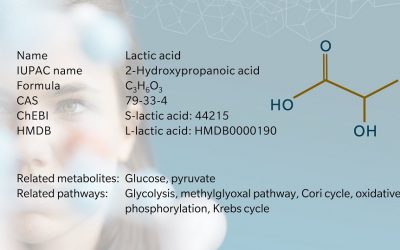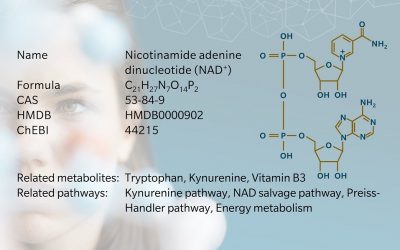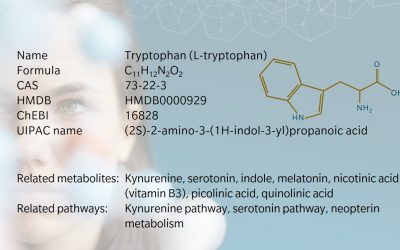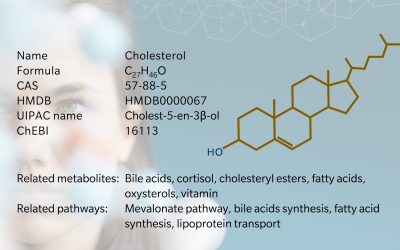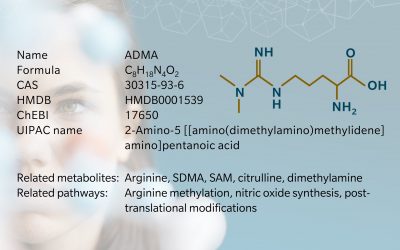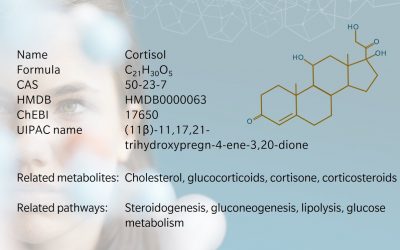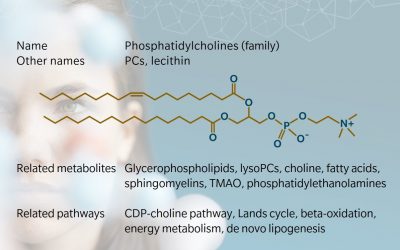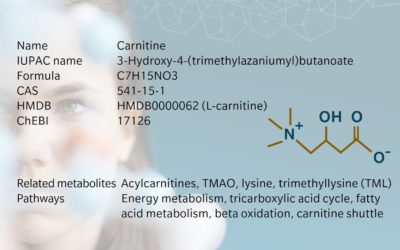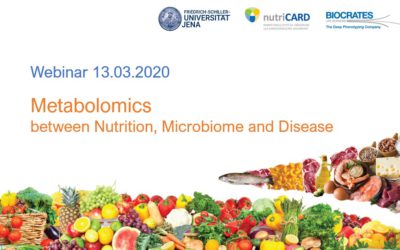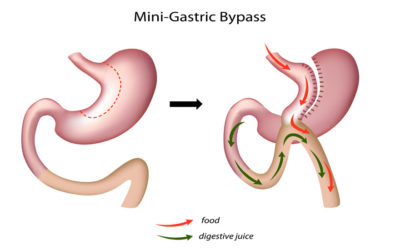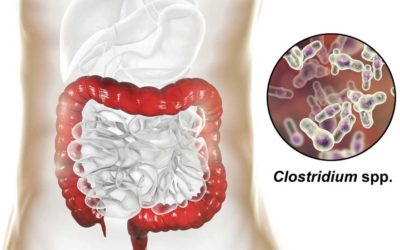
Literature and blog
Mass spectrometry in metabolomics – From methodologies to applications
Metabolomics highlights the significant role of microbial communities in human health, driving a paradigm shift towards towards personalized, proactive healthcare.
Does metabolomics have a place in microbiome research?
Metabolomics highlights the significant role of microbial communities in human health, driving a paradigm shift towards towards personalized, proactive healthcare.
Alpha-pinene – Metabolite of the month
As one of the metabolites responsible for the smell of conifers, alpha-pinene is a fitting choice for our festive Metabolite of the month.
Treatment of non-alcoholic fatty liver disease (NAFLD) as a chemopreventive strategy for other chronic disease: a metabolomics perspective
NAFLD is a key player in other chronic diseases – both as a prevalent comorbidity and a contributing factor. Does this mean that treating NAFLD could prevent those conditions?
The fluid of everything – Urine and precision nutrition
How urine metabolomics advances precision nutrition by enabling personalized, effective, and proactive dietary recommendations.
Cinnamaldehyde – Metabolite of the month
In our metabolite of the month series, our scientists look at one specific metabolite each month. Topics of discussion include the biosynthesis and degradation in a broader health context, and the effect of dysregulation. In this month´s article, they took a closer look at Cinnamaldehyde.
Sphingosine-1-phosphate (S1P) – Metabolite of the month
In our metabolite of the month series, our scientists look at one specific metabolite each month. Topics of discussion include the biosynthesis and degradation in a broader health context, and the effect of dysregulation. In this month´s article, they took a closer look at sphingosine-1-phosphate.
Arginine – Metabolite of the month
In our metabolite of the month series, our scientists look at one specific metabolite each month. Topics of discussion include the biosynthesis and degradation in a broader health context, and the effect of dysregulation. In this month´s article, they took a closer look at Arginine.
Metabolite of the month – Deoxycholic acid
Our metabolite of the month DCA is a secondary bile acid product. Interest in DCA was revived in the 1940s, when it was identified as a precursor for the synthesis of corticosteroids
biocrates at ASMS 2023
Delve into the firsthand experience of the biocrates team at the ASMS 2023 conference, held in Houston, Texas, with a remarkable attendance of over 5,000 participants.
Metabolomics – (not) a game changer in toxicology?
Why is metabolomics a game-changer in toxicology? We think so, but why are toxicologists split on this question?
Metabolite of the month – Alpha-aminoadipic acid
Aminoadipic acid is an alpha amino acid, meaning its amino group is attached to the carbon atom in the alpha position. It’s a nonproteinogenic amino acid found in all eukaryotes.
Metabolite of the month – Aminobutyric acids
Alpha-, beta- and gamma-aminobutyric acids (AABA, BABA and GABA) are a group of structurally similar nonproteinogenic amino acids.
Histamine – Metabolite of the month
Histamine stimulates smooth muscle contraction, vasodilation, and gastric acid secretion, and plays a role in cell differentiation, proliferation and regeneration
Metabolite of the month – Glycine
Glycine plays a role in metabolic regulation, neurological function, anti-oxidative reactions and protein synthesis. It offers multiple health benefits that may help to treat diabetes, cardiovascular disease, cancer, inflammation and obesity.
3 assets needed to excel at metabolomics data interpretation
Data interpretation is often overlooked in omics training. But without knowing how to make sense of our results in the broader biological context, we’ll struggle to pull out actionable insights from our data.The biological interpretation of metabolomics is a long but...
Ornithine – Metabolite of the month
Our metabolite of the month is Ornithine, a non-essential, non-proteinogenic amino acid that plays an essential role in the urea cycle.
Phosphatidylethanolamines – Key lipids in cellular function and membrane integrity
Phosphatidylethanolamine (PE) is a sub-class of phospholipids with a variety of functions in animals, plants and microorganisms. Like other phospholipids, PEs are more than simply the building blocks of membranes
Metabolite – 3-Hydroxy Glutaric Acid (A biomarker for a rare disease)
3-hydroxyglutaric acid is a little known metabolite with great application for the diagnosis of a rare disease.
ICYMI – Recap from “Pan-cohort studies – the future of population health” symposium
With more than 20 hours of cutting-edge science in the rearview mirror, it’s time to reflect on our recent “Pan-cohort studies – The future of population health” event.
Lactic acid – Metabolite of the month
Lactic acid is produced by various cells in the body, including muscle cells, red blood cells and neurons
Which sample matrix should I use for my metabolomics study?
While there’s no single correct approach to figuring out your sample matrix, there certainly are things that could be done wrong. Here, we dive into some of the advantages and advantages of the sample matrices you might consider for you metabolomics study.
NAD+ (nicotinamide adenine dinucleotide) – Metabolite of the month
NAD is best known as a master regulator of redox reactions, but it is also a substrate used by many enzymes to fine tune cell biology.
MxP® Quant 500 kit for SCIEX 7500 LC-MS/MS systems
MxP® Quant 500 targeted metabolomics kit is now validated for use with SCIEX 7500 LC-MS/MS systems
Metabolite of the month – Tryptophan
Tryptophan is a pivotal metabolite in nutrition, inflammation and the gut-brain-axis. This is an overview of what is known about this amino acid although much is left..
Metabolomics 2022 in person
In this article we share our take-aways and experience from Metabolomics 2022 in Valencia. We summarized not only exciting talks, posters and trends but also the thrill of meeting with the metabolomics community in person again.
Metabolite of the month – Cholesterol
Metabolite of the month is your sneak peek into the world of metabolomics. In this month´s article, we took a closer look at cholesterol..
Asymmetric dimethyl arginine (ADMA) – Metabolite of the month
Metabolite of the month is your sneak peek into the world of metabolomics. Topics of discussion include the ..
Adverse effects in immunotherapy
Only 20–30 % of patients experience a long-term benefit from immunotherapy, but the high rate of adverse events in immunotherapies is also a matter of intense research and scientific debate
Cortisol – Metabolite of the month
Metabolite of the month is your sneak peek into the world of metabolomics. In this month´s article, we took a closer look at cortisol, a steroid hormone involved in stress response and beyond.
Phosphatidylcholines – Metabolite of the month
Metabolite of the month is your sneak peek into the world of metabolomics. In this month´s article, we took a closer look at phosphatidylcholines, a class of lipids involved in much more than membrane composition.
Therapy resistance: could metabolomic biomarkers remove this major roadblock to successful pharmaceutical research and development programs?
Pharmaceutical therapies have created huge benefits for society in expanding healthy life span
The winners of the biocrates publishing awards
The biocrates publishing awards recognize the outstanding scientists who are using biocrates technology to make groundbreaking discoveries in the world of metabolomics and beyond.
Indole – Metabolite of the month
Metabolite of the month is your sneak peek into the world of metabolomics. In this month´s article, we took a closer look at indole, a product of tryptophan..
The Metabolomist
The Metabolomist is a podcast for metabolomics researchers to connect with like-minded scientists and explore the unspoken issues in metabolomics research.
Introducing the biocrates publishing awards
The biocrates publishing awards recognize the outstanding scientists who are using biocrates technology to make groundbreaking discoveries in the world of metabolomics and beyond.
Using MxP® Quant 500 kit with Agilent 6495B and 6495C TQ LC/MS systems
Using biocrates MxP® Quant 500 kit for broad metabolic profiling with the Agilent 6495C triple quadrupole LC/MS system
Metabolomics unravels aspects of Alzheimer’s disease
Metabolites and genetic markers help to enlighten aspects of Alzheimer’s disease
Short-term air pollution alters amino acid metabolism
Well-defined exposure to air pollution reveals distinct perturbations of amino acid metabolism
Are effects of antibiotics reflected in the metabolome?
Antibiotics influence the gut microbiome and the plasma or fecal metabolome depending on the class of antibiotics and the gut bacterial composition.
Prediction of bladder cancer progression
A multi-OMICS approach identified metabolic signatures related to fatty acid oxidation in bladder cancer progression.
Targeted metabolomics as a tool to monitor sow and piglet health in swine breeding
Metabolomics helps detect potentially catastrophic health issues in pregnant sows and weaning piglets
Cholesterol metabolism in Alzheimer’s disease
Brain cholesterol metabolism is altered in Alzheimer’s Disease.
Alterations in metabolism might cause chronic kidney disease
Chronic kidney disease and impaired renal function shown to be associated with a variety of metabolites, suggesting the involvement of several metabolic pathways in the disease pathophysiology.
Metabolic effects of anti-TNF α therapy
Anti-TNF α therapy in Crohn´s Disease improves liver steatosis through changes in gut bacteria and triglycerides.
Metabotypes applied to dairy production
Metabotypes help categorize dairy cows with different lactation yields
Pharmacometabolomics provides biomarkers for precision medicine
A combination of various technologies in pharmacometabolomics enables biomarker discovery for prediction of drug responses of individual patients.
Distinct metabolic alterations in cancer- and chemotherapy-induced cachexia
Cancer in comparison to chemotherapy cause distinct metabolic perturbations, which both lead to the development and progression of cachexia characterized by extreme weight loss and muscle wasting.
How different sports shape the blood metabolome
The metabolome differentiates athlete phenotypes
Effect of proton pump inhibitor use on development of cardiovascular diseases
Population-based cohort study reveals link between proton pump inhibitor intake and increasing risk for cardiovascular events.
Irritable bowel syndrome linked to distinct metabolic profile
A metabolic pattern of patients with irritable bowel syndrome (IBS) was identified, providing the key to non-invasive IBS diagnostics.
Dyslipidemia contributes to cardiac autonomic neuropathy in type 2 diabetes
Cardiac autonomic neuropathy is linked to perturbations of the lipid metabolism specifically in Type 2 Diabetes.
Metabolism of fatty liver disease and the impact of therapy
New study demonstrates the power of metabolomics in boosting our understanding of fatty liver disease – and possible treatments. Obeticholic acid reverses metabolic changes in NASH.
Lipid biomarkers improve diagnosis of bacterial meningitis
Free phosphatidylcholines in cerebrospinal fluid are highly promising biomarkers for an improved differential diagnosis of bacterial meningitis.
Metabolomics can help identify root causes of hypertension
Targeted metabolomics discriminates between primary and endocrine hypertension.
New analytical method for the quantification of acylcarnitines
Acylcarnitine profiles of melanoma xenografts in mice could be a step towards a new treatment.
Multi-omics reveals new insights into chronic malarias
Host-parasite interactions in chronic and acute malaria were characterized by metabolomics and transcriptomics in macaques and humans.
Elevated liver fat content disrupts the liver-α cell axis
Elevated liver fat is related to hyperglucagonaemia, which reflects the disruption of the liver-α cell axis.
Defining the biochemistry of obesity
Increasing degree of metabolic dysregulation visible in the blood metabolome depending on the degree of obesity.
How bile salt hydrolases affect the gut microbiome
Bile acid composition and a complex network of bile salt hydrolases in the gut shape microbial colonization.
Metabolomics reveals link between adipose tissue and severe COVID-19
A lipid signature is associated with disease severity and inflammatory status in patients with COVID-19.
Could metabolites enhance pharmacological cancer treatments?
Metabolites in action: metabolomics reveals link between mitochondrial respiration and proteasomal degradation mechanisms, with important implications for cancer drugs.
Prenatal PFAS exposure leads to liver injuries in children
HELIX metabolomics study links prenatal PFAS (perfluoralkyl substances) exposure to metabolic origin of liver injuries in children.
Mechanism of gallstone formation
Chromatin mesh of specific immune cells aggregates bile crystals to gallstones and might constitute a promising pharmacological target against gallstone formation.
Modulating gut microbiota with prebiotics could control type 2 diabetes
Modulation of gut microbiota with prebiotic Fructooligosaccharides (FOS) led to discovery of two novel enterosynes (12-HETE and enkephalin), with potential to control type 2 diabetes
Commentary – A current view on steroid hormones
Although they are only present in low concentration in our bodies, steroid hormones play a crucial role in a variety of biological processes. This article reflects recent studies on the topic.
Giardia lamblia alters bile acid secretion in mice
A neonatal mouse model demonstrated that G. lamblia infection altered the composition of the gut microbiome and enhanced bile acid secretion and deconjugation.
Blood-based score objectively captures dietary patterns
A blood-based predictive metabolomics score provides a tool linking dietary patterns to risk of diabetes that can be used to objectively assess dietary intake.
Microbiome instability and host metabolic dysfunctions
Plasma metabolome and microbiota profiles from the SHIP cohort link microbiome instability to liver steatosis, diabetes mellitus, and pancreatic dysfunction
Circulating metabolites shed light on mechanism of action
The changes in circulating metabolites induced by a multi-AGC kinase inhibitor in mice and patients may contribute to better understand its mechanism of action.
Prediction of cancer survival rate with metabolomics
Metabolomics can be combined with clinical data for the prediction of patient survival after anti-tumor treatment.
Metabolomic profiling and the prediction of 90-day mortality
Plasma lipid profiling for the prognosis of 90-day mortality, in-hospital mortality, ICU admission, and severity in bacterial community-acquired pneumonia (CAP)
Kynurenine metabolites mediate neuromuscular dysfunction
Accumulation of neurotoxic kynurenine metabolites with aging represents the mechanism of neuromuscular defects linking chronic inflammation to physical frailty.
Machine learning for ALS progression biomarker discovery
How to combine targeted metabolomics and machine learning algorithms to identify biomarkers associated with ALS disease progression.
Bile acids and newborn’s gut microbiota maturation
The maturation of the newborn´s microbiome is critically dependent on bile acids from liver and can be manipulated by administration of bile acids in mice.
Circulating metabolites predict coronary heart disease risk
Serum metabolites were associated with risk of coronary heart disease in a population-based cohort, with a comparable strength to classic risk factors.
Carnitine – Metabolite of the month
Metabolite of the month is your sneak peek into the world of metabolomics. This month we look at carnitine #loveyourmetabolites
Elevated serum bile acid levels contribute to NASH-HCC
Higher serum bile acid levels and an altered gut microbiome contribute to fibrogenesis, liver injury, and tumorigenesis in cirrhotic and noncirrhotic NASH-HCC.
Mitochondria’s role in clinical depression
What does brain activity look like after anti-depressant treatment and what is the basis for prescribing serotonin re-uptake inhibitors in the first place?
Gut microbiota and statins
Metabolomics and 16S rRNA profiling uncover the crosstalk between gut microbiota and statins efficacy that can hide behind inter-individual variability.
Is Alzheimer’s a metabolic disease?
Alzheimer’s disease (AD) has many facets. Metabolomics supports Alzheimer’s early diagnosis and research on the treatment of AD.
Lipidomics in cardiac patients after the Fontan procedure
Lipidomics reveals long-term effects of palliative surgeries in Fontan patients after cardiac function is restored.
Therapy response monitoring in infectious diseases
Monitoring COVID-19 patient’s pathophysiology using metabolomics can lead to early detection of therapy response, opening an avenue to precision medicine.
Metabolomics and COVID-19
Monitoring COVID-19 patient’s pathophysiology might lead to early detection of therapy response, opening an avenue to precision medicine. Metabolomics is a tool to support these efforts.
Best practices for feces metabolomics
biocrates enables reproducible quantitative metabolomics in fecal samples. Understand the challenges associated with this matrix.
The metabolic cost of a marathon: fitness matters
Targeted metabolomics reveals differences in metabolic profiles between top athletes and amateur runners days after running a marathon.
Amino acids aid in diagnosis of tuberculosis infection
Amino acids were identified as serum biomarkers for the diagnosis of patients with active tuberculosis infection in a targeted metabolomics study.
Metabolomics in Multiple Sclerosis
Finding a test for different types of multiple sclerosis has been proven to be difficult. Metabolomics as a solution is explored in the study portrayed here.
Webinar report – Metabolomics, Nutrition, Microbiome
“Metabolomics – between Nutrition, Microbiome, and Disease” demonstrates that metabolomics is a powerful tool to study host-microbiota-diet interactions
What urine can tell about the metabolome
Biocrates enables reproducible quantitative metabolomics in urine samples, a biofluid of choice for biomarker discovery in medicine and biology.
Obesity and the microbiome
Metagenomics, metaproteomics and metabolomics create an exciting mix of approaches to understand systematic changes in an organism after external perturbations.
Does metabolic syndrome manifest itself differently?
An international team of scientists applied targeted metabolomics to deepen the mechanistic understanding of metabolic syndrome and its regional specificities.
Which metabolites tell your diet?
Uncovering the mechanism linking the Mediterranean diet with reduced risk for cardiometabolic diseases using targeted metabolomics.
Could probiotics replace antibiotics?
How can the use of antibiotics in animal farming be reduced? Probiotics might be a solution.
Make sure your drug fits to your cancer
The response of cancer cells to checkpoint inhibition therapy can be predicted using metabolomics.
Arginine metabolism: Targeted metabolomics and biochemical pathways
Metabolic syndrome is associated with changes in amino acid metabolites. The korean genome and epidemiology study finds involvement of arginase activity
Feature: MetaboINDICATOR and biogenic amines
Targeted metabolomics support the study of animal health. The diet of cows (high vs low energy) has influence on the metabolite levels of the offspring.
Gender differences in brain – revealed by metabolomics
Female and male mice may think differently. Targeted metabolomics reveals differences in brain chemistry between the two which might account for behavioral differences.
A metabolic profile of all-cause mortality risk
To predicting life expectancy standardized and reproducible scientific methods are needed. Metabolomics is one way to approach this question.
Betaine for a healthy life and brain?
Betaine supplementation has a profound effect on phospholipid metabolism. Its effect on brain and liver health can be studied using targeted metabolomics.
Serine – nonessential for you, but essential for cancer
One of the widely accepted hallmarks of cancer is metabolic deregulation. By integrating transcriptome, proteome, and metabolome analysis insights on cancer can be gained.
Microbiome and cognition in Alzheimer´s disease
Due to the fact that in Alzheimers bile acids as well as the microbiome play a key role, standardized metabolomics is particularly well adapted to study Alzheimers.
Metabolomics can indicate favorable response to microbiota transfer
The study of the microbiome is a vital part of personalized medicine. Targeted metabolomics supports patient stratification in Clostridiodes patients.
Metabolomics of acute heart failure
Acute and chronic heart failure can be studied using metabolomics. The metabolic phenotype (especially lipids/ amino acids) rapidly changes upon these condition
Nutrition might still improve your health
The health benefits of Omega 3 fatty acids are well documented. Metabolomics studies can help to elucidate the beneficial effects of nutrition on body and mind.





